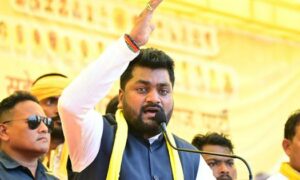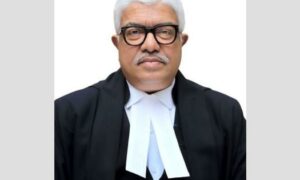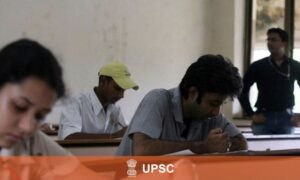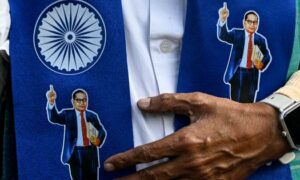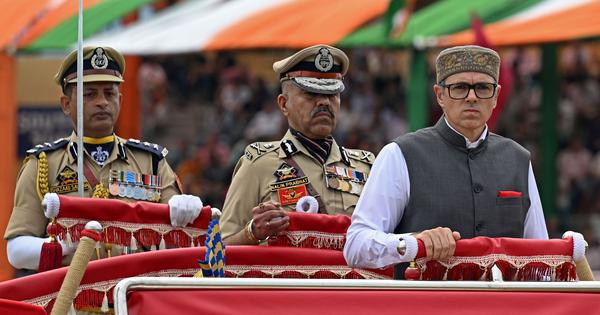
During his Independence Day speech in Srinagar in August, Jammu and Kashmir Chief Minister Omar Abdullah struck a sober note.
“The last time I stood here, I was chief minister of a state,” Abdullah said, addressing an official function in Bakshi stadium. “We had an Assembly that made decisions, and a cabinet that implemented them. We had our flag, our constitution, our laws.”
He went on: “Today, I am chief minister of a Union territory. Cabinet decisions are passed, but many don’t get cleared. Some files don’t return. Some disappear.”
The admission of powerlessness was a far cry from Abdullah’s campaign speeches for the assembly last year.
At the time, Abdullah’s party, the National Conference, had promised to strive for “full autonomy” of Jammu and Kashmir within the Indian Constitution, to undo the Narendra Modi government’s decisions to scrap the state’s special status and downgrade it into a Union territory.
The party promised to restore Articles 370 and 35A, which had till August 2019 granted locals of Jammu and Kashmir exclusive rights over owning immovable property and jobs in the troubled region.
The party had also promised to put an end to “unjust terminations” of government employees on the grounds of national security, which had become common under the Lieutenant Governor’s rule, make efforts to release prisoners, repeal the draconian preventive detention law, the Public Safety Act, and create one lakh jobs for the youth.
It was a winning manifesto. The National Conference secured a landslide victory in the first ever assembly elections held in the Union territory.
On Thursday, as Abdullah’s government completes one year in office, however, there is a pervasive sense of disappointment in its performance.
A large section of voters and political observers told Scroll that Abdullah’s first year has been “a failure in governance”. “As anticipated by many, the National Conference government has failed to deliver both on governance and political issues,” said a political observer, who declined to be identified.
Another political commentator in Srinagar held the chief minister responsible for the drift. “Nobody would have expected them to get back Article 370 but to put up a strong fight for statehood was expected. However, here we are in a situation where the CM himself seems to be helpless and confused about his position and powers.”
On the ground, the mood against the National Conference is one of dissatisfaction.
“There has been no change in the Centre’s strong-arm approach towards Kashmir and the elected government is acting as a spectator,” said a Srinagar businessman, who requested anonymity.
He was referring to the Abdullah government’s silence on the termination of government employees or the use of the Public Safety Act against ordinary people as well as politicians. “They can’t escape the moral responsibility by saying law and order isn’t under our jurisdiction,” the businessman said. “This government does not [seem to voice] what people are going through.”
The leaders of the National Conference, however, say the party has fulfilled the “promise of intent and direction.”
Tanvir Sadiq, chief spokesperson of National Conference, argued that it’s too early to judge the performance of the government.
“No government can fulfill every promise in its first year of a five-year mandate, but what distinguishes us is our clarity of purpose and visible progress,” Sadiq told Scroll in a written response.
Waiting for statehood
When the National Conference government was sworn in, several political observers expected it to have a hostile relationship with the Centre and the Lieutenant Governor administration, akin to the Arvind Kejriwal’s confrontations as chief minister of Delhi.
Barely a week after taking oath as the chief minister last October, Omar Abdullah extended a hand of cooperation. He landed in New Delhi to submit a cabinet resolution asking for the restoration of Jammu and Kashmir’s statehood to Prime Minister Narendra Modi and Union Home Minister Amit Shah.
On his two-day visit, Abdullah presented Kashmiri shawls to several BJP leaders – what the Opposition in Kashmir derisively called “shawl diplomacy”.
That set the tone of the National Conference’s engagement with New Delhi. In contrast, the Centre has barely reciprocated.
After his first meeting with Modi and Shah, Abdullah had said that he had “received assurances at the highest level that the commitments made to Jammu and Kashmir, particularly with regard to our governance model, will change.”
But the restoration of statehood does not appear to be anywhere close to reality. On August 15, Abdullah announced a door-to-door campaign for statehood.
Even otherwise, New Delhi has made no bones of its unequal relationship with the elected chief minister in a setup where the Centre-appointed Lieutenant Governor has key powers.
In September, the Telegraph reported that the chief minister was not able to enter the main sanctum of the most revered Muslim shrine of Hazratbal in Srinagar allegedly at the behest of Bharatiya Janata Party-controlled Waqf Board.
Similarly, during the Union Home Minister Amit Shah’s visit to Jammu last month to assess damage caused by floods, the National Conference found itself in the middle of another embarrassing moment. Pictures of Shah inspecting damages while Abdullah remained in the background behind officials and security personnel, triggered an online storm against what many called “humiliation” of the elected representative. Among those who stood with Shah were Lieutenant Governor Sinha and Sunil Sharma, Leader of Opposition from BJP.
But it is not the marginalisation of an elected chief minister alone. “The present administrative structure which is hostage to two rival political dispensations has worsened the quality of governance,” said the first political commentator.
Several observers conceded that the government has little wiggle room in the current set-up.
As the elected government of a Union territory, it has no say in areas like security and law and order. This is a major handicap for any government in a region where security and control over forces takes precedence over almost every other aspect of governance.
The transaction of business rules that would have offered clarity on the demarcation of powers between the Lieutenant Governor administration and the elected government has still not been finalised.
Sadiq, the National Conference spokesperson, admitted that the dual power set-up was a problem. “We have faced genuine challenges, operating under a dual power centre where even elected MLAs had to wait months for their Constituency Development Funds…” he added.
Report card
For its governance record, the National Conference government has not much to show, except for its social welfare schemes for the underprivileged – giving 200 units of free electricity and 10 kg rice to the poorest families, free bus travel for women across the union territory, and Rs 75,000 assistance for young women at marriage, among others.
When it comes to the larger anxieties of the people of Jammu and Kashmir after August 2019, people have not found any succour. For example, there has been a marked silence from the National Conference on issues like political prisoners or detentions under the notorious Public Safety Act.
The National Conference, however, says it has repeatedly raised these issues with New Delhi. “Time and again, the chief minister has raised these issues with the Union Home Minister,” Sadiq said. “In the current setup, our role is to highlight and raise such concerns and we are doing exactly that. Once law and order returns to the government’s hands, we will address these matters transparently and resolve them effectively.”
Yet, the party has clearly avoided being too harsh in its criticism of the Centre. For example, when the Aam Aadmi Party’s Doda MLA, Mehraj Malik, was detained under the Public Safety Act in September, the National Conference government did not make much noise about the detention.
While Abdullah said that there’s “no justification” for detaining Malik and called it wrong, his government ignored the Aam Aadmi Party’s request of convening a special session of the Jammu and Kashmir Assembly to pass a resolution against Malik’s detention.
Reservation policy
Many youngsters who voted for the National Conference in the last election feel dejected – especially on the question of reservations. “They have made a fool of us,” said Nasir Ahmad, a 27-year-old student from South Kashmir’s Kulgam district who voted for the first time last year.
Like thousands of open merit or general category students in Jammu and Kashmir, Ahmad had voted for the National Conference because of its promise to “review” the existing reservation policy for jobs and education.
Over the last year, the Lieutenant Governor administration has altered the reservation allotments to breach the 50% cap set by the Supreme Court. While that has benefited the million-strong Pahari speaking community, it has led to massive protests by general category students, who account for 69% of Jammu and Kashmir’s population.
In the run-up to the 2024 Assembly elections, the National Conference had promised that the new reservation policy “will be reviewed and any injustice and imbalance will be corrected”. “Now, the very same leaders who convinced us to elect them are telling us that they don’t have powers to even transfer a peon. Isn’t this cheating?” Ahmad asked.
After coming to power, the Abdullah government tasked a cabinet sub-committee to review the reservation policy and asked it to submit a report within six months. To the utter frustration of thousands of youths, once the report was tabled in June, the government forwarded it to the law department for opinion and comments. Since then, the needle has not moved an inch.
Sahil Parray, a student activist who has been actively pursuing the matter of rationalisation of reservation policy, said the government’s attitude has not been encouraging. Parray said the government told the students that the law department has “identified some errors” in the committee’s report and as a result it has been returned to the social welfare department for corrections. “In short, they seem to be avoiding the issue and stalling for time,” Parray said. “We are very disappointed by their lack of seriousness.”
Nasir Ahmad, the student from Kulgam, pointed out a fundamental contradiction. “If my vote elects a leader who doesn’t have any power, then what’s the value of my vote?” asked Nasir Ahmad, the student from Kulgam.
📰 Crime Today News is proudly sponsored by DRYFRUIT & CO – A Brand by eFabby Global LLC
Design & Developed by Yes Mom Hosting

